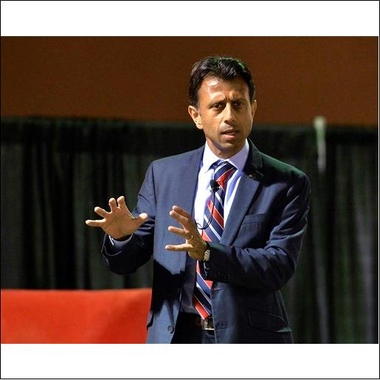Jindal issues order after religious objections bill rejected

Baton Rouge, La. (AP) — Louisiana lawmakers on Tuesday shelved a divisive religious objections bill pushed by Gov. Bobby Jindal that has thrust the state into the national debate about where religious freedoms end and the rights of same-sex couples begin.
But the Republican governor, who is courting Christian conservatives for a likely presidential bid, quickly fought back against the defeat, seeking to enact the bill's provisions without legislative support.
Both Republicans and Democrats on a House legal committee voted 10-2 for a procedural move designed to kill the proposal, ending weeks of controversy about the bill and handing Jindal a significant defeat for his legislative agenda.
Hours after the bill was rejected, Jindal issued an executive order aimed at doing the same thing as the bill, only on a smaller scale limited to the executive branch.
"What we are seeing today in America is an all-out assault on religious liberty," said Jindal, who called the executive order the "next best thing" to signing the bill.
The order would be effective several months beyond his administration's end unless Louisiana's next governor rescinds it, Jindal said.
Stephen Perry, a vocal critic of the bill who heads up the New Orleans Convention and Visitors Bureau, dismissed Jindal's order as "largely a political statement" that "will have very little practical impact."
Perry, a former chief of staff to one of the state's previous Republican governors, said case law and even the state constitution limit the governor's ability to rule by fiat.
"No Executive Order of a governor may create substantive law, even in an emergency situation," he said in a statement.
Meanwhile, Rep. Mike Johnson, the lawmaker who sponsored the proposal, said he would push for another hearing this legislative session.
"We don't throw in the towel. We always stand for freedom," said the Bossier City Republican. "We're entering a new era in America where changing ideas about the institution of marriage conflict with the old ideas about religious freedom."
Louisiana's constitution bans same-sex marriage, and there are no statewide discrimination protections for gays and lesbians. But Johnson proposed the bill because he predicts a U.S. Supreme Court ruling expected in June will strike down gay marriage bans across the country.
As written, the proposed law would prohibit the state from denying individuals, businesses and nonprofits any licenses, benefits, jobs or tax deductions because of action taken "in accordance with a religious belief or moral conviction" about marriage.
Like in Indiana and Arkansas, where backlash prompted changes to similar laws, the proposal faced formidable opposition from LGBT supporters and big business. Critics said the bill would sanction discrimination against LGBT couples — though Johnson disagrees.
What the measure would do is bar the state from taking some punitive actions against a person who refused to serve someone based on a belief about same-sex marriage.
That, in effect, would allow discrimination, critics say.
Perry, the head New Orleans tourism official, called the bill "radioactive" and said it would make Louisiana "complicit in officially state-sanctioned bigotry." Any bid to host a Super Bowl, Final Four or college football championship in New Orleans would be doomed if the measure were approved, he said.
"We're attempting to ... carve out the ability to discriminate, the ability to be bigoted," Perry said.
Proponents of the bill have cited wedding photographers, planners and bakers as examples of people who should have legal protection if they object to serving same-sex couples.
"It would effectively prevent you from getting the death penalty as a business owner if you stood by your traditional belief in marriage," Johnson said. "I think that's a belief that worthy of protection."
But in the committee hearing Johnson acknowledged that the bill would also bar the state from firing or revoking the license of an emergency room surgeon who refused to operate on someone in a same-sex marriage, or a teacher who refuses to meet with a student's gay or lesbian parents.
"At any other time in history, the average person could live an entire life without having to publicly articulate a view on lesbian, gay, bisexual or transgender politics," said Gene Mills, president of the conservative Louisiana Family Forum and a supporter of the bill. "Now we are being asked to choose sides in the culture war."
The Louisiana Democratic Party accused Jindal of being determined to "wreck" the state's tourism industry and called the executive order a "stunt."
"Louisiana taxpayers and businesses are once again being forced to foot the bill for Jindal's vanity," said Stephen Handwerk, the party's executive director, said in a statement.
By Brian Slodysko, Associated Press. Copyright 2015 The Associated Press. All rights reserved. This material may not be published, broadcast, rewritten or redistributed.
The Gayly – May 20, 2014 @ 9:15am.





